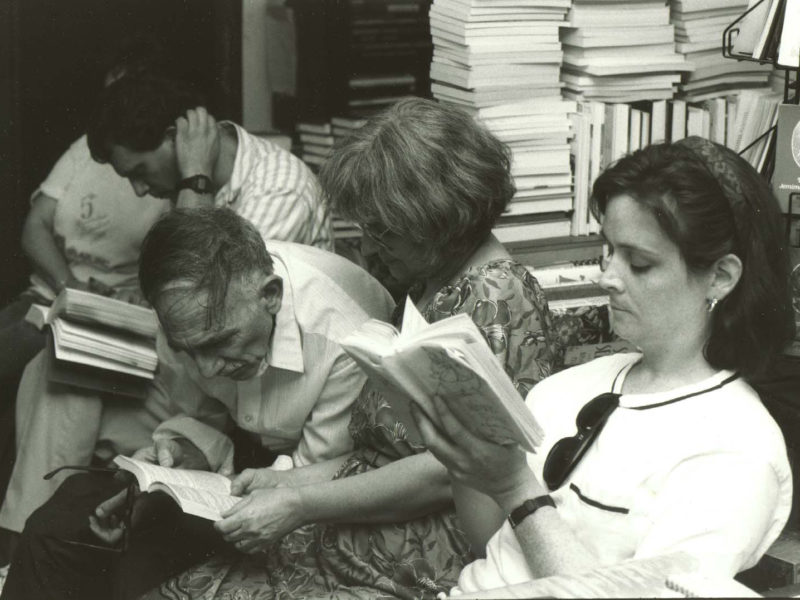

I wish I could remember the first time I stepped into Canio’s Books, which would have been in the spring of 1982. Probably a Saturday or Sunday because at that time the proprietor’s true occupation was public school teacher Monday to Friday and he would need that income for quite some time to underwrite the venture he had rashly undertaken two years earlier. And probably the shop did not impress me because I had just relocated from Manhattan where independent bookstores were a dime a dozen, including legendary ones like the Strand and the Mysterious Book Shop. It took a little time for me to fully appreciate what has become a local cultural institution, with Canio’s Books celebrating its 40th anniversary this month.
It almost never made it, thanks to me, because I sort of set it on fire. I’ll get back to that in a minute.
In an historic village like Sag Harbor, 40 years in business may not seem like a big deal. Schiavoni’s IGA has passed 75 years and other well-known establishments with decades of endurance include the Sag Harbor Variety 5 and 10, The Wharf Shop, Corner Bar, and a handful of others. But most of us are aware of the special challenge independent bookstores have faced, first from the chains like Barnes and Noble and more recently the Amazon juggernaut. Yet year after year, one can walk into Canio’s to browse, now seven days a week thanks to the attentiveness of its owners, Maryann Calendrille and Kathryn Szoka.
About that fire. But first, the initial impressions of the shop. Canio Pavone himself was a benign pasha of poetry and other forms of literature. He always seemed surrounded by a coterie of supportive and cheerful women, and his wife, Nora, did not seem to mind that at all. I formed a special fondness for Benedetta Deubel, who lived around the corner on John Street and was a kind of greeter, a smile for everyone she met. What appealed to me most was being able to attend an author reading. One would be held every Saturday — later, some Friday evenings and Sunday afternoons too — and they were free and sometimes there were music performances. This was manna from heaven for a freelance writer who could barely pay the rent — even then, when a year-round house near the Salty Dog in Noyac was only $400 a month.
There is the by-now familiar story of the literary lion in winter, Nelson Algren, donating books to Canio’s when it first opened in October 1980 and then inaugurating the weekly reading series by giving one that attracted a large enough crowd that Canio had to borrow chairs from the Yardley & Pino Funeral Home. When I had the temerity to ask, what a thrill it was for an aspiring writer to be offered the Saturday at 6 slot, and I gave my first reading there sometime in 1982. Mercifully for readers, the rest of the novel-in-progress I read from never saw the light of day, but for this writer, the kindness of Canio opened the door to all sorts of possibilities.
Before the fire, and after the hubris of doing a reading, my contribution to the shop was helping to found the marathon readings of “Moby Dick.” Canio’s was a place you simply dropped into, a salon instead of saloon, and you would usually find someone you knew, and if not, well, there was no one more congenial than Canio. In June 1983, I popped in and found him chatting with Val Schaffner, who is now a book publisher but was then the managing editor of the East Hampton Star. I wanted to discuss the marathon reading of “Ulysses” that had just taken place in New York City for Bloomsday. What about a marathon reading in Sag Harbor — maybe of something by John Steinbeck? “Okay.” Really, that was the answer, meaning: Sure, why not? I think it was Val who thought “Moby Dick” would be better and Canio designated Labor Day Weekend and proceeds (ha!) would benefit Okeanos, the whale research organization.
So on the Saturday of that holiday weekend, Joe Pintauro, intoned, “Call me Ishmael” and we were off. He was followed by Helen Henslee, Kurt Vonnegut, and Marc Jaffe. Knowing I did not belong in such illustrious company, I had signed up for 2 a.m. I stuck around long enough afterward to see, an hour later, two women dressed as pirates, one with a live parrot perched on her shoulder, enter to listen. On Sunday morning, Hugh Williams and his family sailed a boat from North Haven to the Long Wharf and walked the length of Main Street to Canio’s carrying harpoons. At 6 p.m. on Sunday, Joe Pintauro was back to read the last lines of Herman Melville’s epic. My recollection is that marathon was held for 10 years’ straight, with the steadfast Canio sitting through every minute of it.
Okay, about that fire. Emboldened that anything was possible at the shop, I suggested a series of classic films to be shown every Friday evening. The debut movie would be “City Lights” because I had prevailed upon Robert Parrish to give a talk after the showing. This was quite a coup because Bob, an Oscar-winning film editor and director who lived in North Haven, had as a child actor appeared in the 1931 Charlie Chaplin comedy. I borrowed a projector from Pierson High, obtained the film from the Suffolk County Library archives, put up flyers around town, and we had a full house — maybe 25 people — that first Friday.
Attendees loved the movie, some weeping at the end, and just as Bob Parrish began to speak, smoke filled the shop. Everyone squeezed through the narrow doorway to the chilly street and the fire vehicles arrived. It was believed the fire emanated from the upstairs apartment, but firemen seeing that an old movie had just unspooled on a projector in a room packed with paper spelled the end of the Canio’s Classic Film Friday series.
Thankfully, Canio’s Books has endured the likes of me and probably worse, especially the vagaries of independent bookselling. I’ve had the honor of doing readings there over the years — from stuff actually published — and to attend ones given by others. Every time I enter that somewhat sacred space I think not just of the past but of the future, one that includes such shops remaining in our lives. For those of us who care about the printed word — whatever form “printed” is today — stepping into Canio’s 40 years after its humble beginning is to still be inspired. As Melville wrote in “Moby Dick”: “Book! You lie there; the fact is, you books must know your places. You’ll do to give us the bare words and facts, but we come in to supply the thoughts.”
On Wednesday, October 21, at 7 p.m., Canio's Books commemorates 40 years of literary bookselling and Turtle Point Press' 30th anniversary in a virtual celebration. Jeannette Watson of legendary Manhattan bookstore Books & Co. will moderate a discussion with distinguished professor and poet Grace Schulman; musician, writer, and artist Joseph Keckler; author Michael Carroll; acclaimed poet and novelist Diane Glancy; esteemed literary editor Ira Silverberg; and Turtle Point publisher and editorial director Ruth Greenstein.
To register, crowdcast.io/e/turtle-point-press-30th-anniversary-with-canios-books/register.
 More Posts from Tom Clavin
More Posts from Tom Clavin